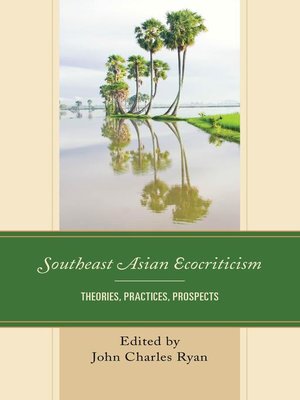Southeast Asian Ecocriticism
ebook ∣ Theories, Practices, Prospects · Ecocritical Theory and Practice
By John Charles Ryan

Sign up to save your library
With an OverDrive account, you can save your favorite libraries for at-a-glance information about availability. Find out more about OverDrive accounts.
Find this title in Libby, the library reading app by OverDrive.



Search for a digital library with this title
Title found at these libraries:
| Loading... |
Southeast Asian Ecocriticism presents a timely exploration of the rapidly expanding field of ecocriticism through its devotion to the writers, creators, theorists, traditions, concerns, and landscapes of Southeast Asian countries. While ecocritics have begun to turn their attention to East and South Asian contexts and, particularly, to Chinese and Indian cultural productions, less emphasis has been placed on the diverse environmental traditions of Southeast Asia. Building on recent scholarship in Asian ecocriticism, the book gives prominence to the range of theoretical models and practical approaches employed by scholars based within, and located outside of, the Southeast region.
Consisting of twelve chapters, Southeast Asian Ecocriticism includes contributions on the ecological prose, poetry, cinema, and music of Indonesia, Malaysia, Myanmar, the Philippines, Thailand, and Vietnam. The authors emphasize the transnational exchanges of materials, technologies, texts, motifs, and ideas between Southeast Asian countries and Australia, England, Taiwan (Formosa), and the United States. From environmental hermeneutics, postcolonial studies, indigenous studies, and ecofeminism to critical plant studies, ecopoetics, and ecopedagogy, the edited collection embodies the dynamic breadth of interdisciplinary environmental scholarship today.
Southeast Asian Ecocriticism foregrounds the theories, practices, and prospects of ecocriticism in the region. The volume opens up new directions and reveals fresh possibilities not only for ecocritical scholarship in Southeast Asia but for a comparative environmental criticism that transcends political boundaries and national canons. The volume highlights the important role of literature in heightening awareness of ecological issues at local, regional, and global scales.
Consisting of twelve chapters, Southeast Asian Ecocriticism includes contributions on the ecological prose, poetry, cinema, and music of Indonesia, Malaysia, Myanmar, the Philippines, Thailand, and Vietnam. The authors emphasize the transnational exchanges of materials, technologies, texts, motifs, and ideas between Southeast Asian countries and Australia, England, Taiwan (Formosa), and the United States. From environmental hermeneutics, postcolonial studies, indigenous studies, and ecofeminism to critical plant studies, ecopoetics, and ecopedagogy, the edited collection embodies the dynamic breadth of interdisciplinary environmental scholarship today.
Southeast Asian Ecocriticism foregrounds the theories, practices, and prospects of ecocriticism in the region. The volume opens up new directions and reveals fresh possibilities not only for ecocritical scholarship in Southeast Asia but for a comparative environmental criticism that transcends political boundaries and national canons. The volume highlights the important role of literature in heightening awareness of ecological issues at local, regional, and global scales.






